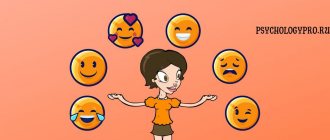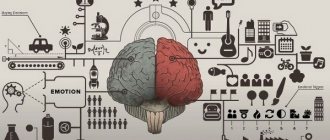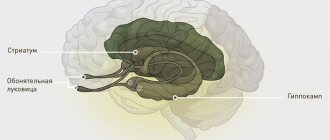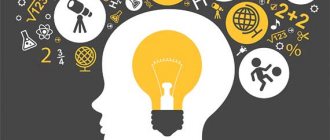What is emotional intelligence?
Emotional intelligence (EQ) is the ability to perceive, control, and critically evaluate emotions. Both your own and other people’s emotions. Some believe that this is a unique innate skill, others say that emotional intelligence can be developed.
The ability to monitor and manage your emotions is an important skill both in everyday life and in your career. Also in the work environment, the ability to read other people's emotions and respond appropriately to them is highly valued. All of this is closely related to emotional intelligence and helps people build more successful careers (and lives).
Why is emotional intelligence so important?
Because EQ is used in different areas of life. Increased emotional intelligence can influence a person's success in school and work. It allows you to show leadership qualities, find contact with different people and lead them. And also convince them that you are right.
Steadily developing emotional intelligence has a beneficial effect on physical health. It helps to work through stressful situations and reduce their impact on the body.
Also, uncontrolled emotions can lead to the manifestation of psychological diseases. Most often, improper handling of your feelings leads to anxiety and depression. Developed EQ helps to avoid such consequences.
Having developed emotional intelligence, it is easier to understand other people, perceive their emotions, express sympathy, choose the right words, etc. Together, this helps to build closer and more reliable relationships with colleagues and loved ones.
Signs of Low Emotional Intelligence
When the concept of emotional intelligence first appeared in the work of Michael Beldock in 1964, for many, everything fell into place: the missing link in the understanding of success was finally found. This is why people with average IQs became billionaires, created international businesses, and were great leaders. And this is why high intelligence, which seemed to guarantee a bright future, was in fact not always its constant attribute.
Psychologists in our time have gone even further: now they believe that emotional intelligence is the most valuable skill for any person. This is only partly true, because there are professions where cognitive development is decisive. But if we talk about happiness in general and the ability to communicate with people, then emotional intelligence has no equal.
It affects how we manage our behavior, solve problems in society, make decisions, and achieve goals.
It is difficult to calculate the emotional intelligence quotient; there is still no test that would show an objective assessment. However, there are signs you can watch for that will help you figure out what's going on. Here are the ones that indicate a low level.
1
You get stressed easily
If you do not recognize the emerging negative emotions, you will experience high levels of stress within minutes. Unrequited emotions strain the mind and body. High emotional intelligence allows you to make stress manageable and recognize unpleasant feelings inside in the early stages.
2
You have a low level of assertiveness
Assertiveness is a person’s ability not to depend on external influences and assessments, to independently regulate their own behavior and be responsible for it. This is something between aggressiveness and passivity in dealing with people. Nobody owes you anything, but you don’t have to either, the boundaries are clearly defined.
Assertiveness is needed so that no one “sits on your neck.” This means having good manners and being friendly, but also keeping people at a distance if they want to take advantage of you. Low EI prevents you from doing this: you either give up and remove your own boundaries, or act aggressively, attacking your interlocutor with or without reason.
3
You have a limited emotional vocabulary
All people experience emotions, but only a select few can clearly define and name what is happening to them. Others, if they try to do this, are mistaken in terms.
A person with low EI will characterize his state as “I feel bad”, a person with high EI will say: irritated, upset, angry, anxious, excited, worried, tense. The more specific the choice of words, the greater the chances of coping with the condition.
4
You make assumptions quickly and defend them fiercely.
People with low EI quickly form opinions and then succumb to confirmation bias and seek only information that confirms they are right. This is especially dangerous for leaders, since their ideas influence dozens of other people.
Outsiders in EI are afraid to admit they are wrong because it causes discomfort and pain. People with high emotional intelligence admit mistakes because they know how to deal with them.
5
You are touchy
Resentment is a reaction to stress. If you have long dreamed of getting rid of stress, stop being offended. Give up anger and dissatisfaction and you will begin to feel better and improve your health.
6
You often feel misunderstood
This usually happens when it comes to how you feel. A sign of low emotional intelligence is that when communicating with people you have difficulty expressing your thoughts and getting the message across.
The bad thing is not that you express your thoughts poorly (even great leaders are guilty of this), but that you don’t notice it right away. This becomes clear later, when it is too late to make amendments and clarify. Learn to read a person's body language, observe his reaction, and constantly seek feedback.
7
You don't know your triggers
We all have triggers—situations and people that “push special buttons” and force us to act impulsively. Emotionally intelligent people learn their triggers and use this knowledge to avoid falling prey to circumstances and manipulation.
8
You're not angry
Emotional intelligence is not about being good, it is about managing your emotions to achieve results. Sometimes this means showing people that you are upset or worried. Masking emotions is not a sign of a genuine, genuine person.
Emotionally intelligent people intentionally use negative and positive emotions in appropriate situations.
We wish you good luck!
We also recommend reading:
- Storytelling
- Golden rules of assertiveness
- How to become smarter: 4 types of intelligence according to Stephen Covey
- 6 Skills to Develop Emotional Intelligence
- Ways to Develop Emotional Mastery
- Emotional Intelligence in Leadership
- Valentine's card from 4brain
- Gardner's Theory of Multiple Intelligences
- Vitality Quotient VQ: What is it and why is it important?
- Emotional Labor
- Seven Leadership Transformations
Key words:1Self-knowledge
Components of emotional intelligence
EQ is an entity made up of several individual skills. They are interconnected, but develop separately. They can also be present in one person, but in different proportions.
The human task is to analyze each component and regularly subject it to critical evaluation.
Communication skills
As I said above, emotional intelligence helps to establish and maintain contacts. This is especially important in professional activities when creating new business connections, communicating with partners, etc.
Also, developed communication skills help build more productive relationships between employees in the same office. They can ask for help and resolve any conflicts verbally.
A boss with a high EQ can raise serious issues and facilitate team discussion, achieving positive results from that discussion (for example, reaching a decision on an issue that concerns the entire office).
Motivation
This essence is closely related to EQ and is often included by experts as part of emotional intelligence. Motivation refers to the ability to set goals and achieve them.
Motivation is what creates the desire to perform certain tasks. A good motivator can motivate a whole group of people to complete even extremely difficult tasks.
Motivation also makes it possible to better cope with failures, assess the situation and return to work.
Empathy
The most important part of developed emotional intelligence is the ability to read other people's emotions and plan your actions based on how other people feel. Correct interpretation of emotions makes it possible to choose the best time to make difficult decisions. Employees with developed empathy are able to predict the reactions of others and avoid possible problems and conflicts.
Concern about other people's thoughts and feelings in the team creates a healthier and more humane atmosphere in the team. In modern society, no matter how trivial it may sound, this approach helps to increase productivity, reduce the overall level of stress and anxiety, and also reduce turnover due to a comfortable working environment for everyone.
Social responsibility
This skill gives a person the opportunity to recognize himself as part of a team and learn to work with other people. This type of responsibility obliges a person to be responsible for the decisions made and the overall result of the work. An important skill for those planning to take a leadership position.
Feeling responsible for the outcome of the activity, each employee will try to do the maximum so that the team does not “fail”. There will be no anchor employees who think that everything will be decided for them.
Ability to control and resolve conflicts
Another aspect of emotional intelligence that is highly valued in a professional environment. The ability not only to smooth over conflicts, but to resolve them, clearly understanding the causes and consequences.
Teams consisting of such workers show high efficiency in even the most difficult situations. Productivity increases, any destructiveness is transformed into constructiveness. Conflicts are perceived as a way to realize mistakes and become better.
What is emotional intelligence
Emotional intelligence is the ability to recognize your own and others’ emotions and manage them. If IQ measures a person’s intellectual, logical and analytical abilities, then EQ measures personal and social skills. If you manage to make friends with emotions, you will be able to establish relationships with people.
If the concept of intelligence quotient (IQ) has existed for more than a hundred years, then people started talking about EQ only in 1990, when a small article appeared in a scientific journal called Emotional Intelligence. It was written by researchers John Mayer and Peter Salovey, who found evidence that emotional intelligence can be considered a separate type of intelligence and considered a reasonable way to approach the data we receive through emotions.
The article was published, but almost no one read it, so all the credit went to Daniel Goleman, a journalist for The New York Times, who in 1995 revised the article and wrote the book “Emotional Intelligence: Why It May Matter More Than IQ.” In it, he described the four main components of EQ:
- Self-awareness.
The ability to recognize and analyze one’s own emotions, as well as knowledge of one’s strengths and weaknesses. - Self-control (self-management).
The ability to manage your emotions and maintain emotional balance even in critical situations. - Empathy.
Understanding the emotions of others and the ability to communicate with others taking into account their internal state. - Relationship skills.
Ability to interact with people, manage their emotions, resolve conflicts, work in or lead a team.
The book quickly hit the bestseller list, and Goleman is still considered the author of the concept of Emotional Quotient, although he only popularized the theory. The story is dramatic, but let's return to the term itself. Researchers have accumulated quite a lot of claims against him. Firstly, there is no clear definition of emotional intelligence, and without this the concept cannot be called scientific. Secondly, EQ strongly overlaps with the theory of psychotypes. Thirdly, there is no generally accepted way to measure emotional intelligence, which also raises doubts about its objectivity. This does not mean that you can not monitor your own and other people’s emotions, you just need to be critical of the theory of EQ and not spend money on courses that promise to improve it in a week.
“The whole concept of emotional intelligence is based on how to properly manage your own and other people’s feelings. We have long been taught to suppress emotions, especially negative ones, but EQ encourages us to use them to achieve our goals. Let's say you can ignore anger and try to be calm, or you can, on the contrary, intensify it. This is useful in some situations. For example, when you are very nervous before a meeting with your manager and cannot put two words together. Add a little irritation to yourself, and it will become a drive that will increase self-confidence,” says Alena Aleshina, EQ development coach.
How to use EQ?
It can be used in a variety of life situations.
- Learn to accept criticism so as not to enter into conflicts.
- Learn to cope with mistakes and constantly move forward.
- Be able to say “no” when the situation demands it. In everyday life and at work.
- It is correct to share your emotions with other people, without inventing anything or deceiving others.
- Know what exactly you are doing and why you are doing it. That is, to competently cope with goal setting.
- Be able to correctly evaluate the actions of other people and not judge them excessively.
Why is emotional intelligence needed?
According to the Brighton School of Business and Management, EQ at work is twice as important as hard skills, and 44% of employees surveyed consider this indicator to be a hallmark of effective leaders. With a high EQ level you will be able to:
- cope with pressure and stress from work;
- effectively manage yourself and others during negotiations;
- get what you need from your colleagues;
- earn the respect of others;
- motivate the team;
- resolve conflicts.
“The level of emotional intelligence affects how successfully a person builds his work relationships. Now all employees, even in entry-level positions, communicate a lot with colleagues: projects appear in which the result largely depends on communication. If an employee does not control himself, he becomes toxic or simply unknowingly spoils the mood of those around him. In almost every team there are people who are always dissatisfied with something, whine or get irritated. And a person with high emotional intelligence is aware of how he influences others and focuses on what emotional state corresponds to his goals and objectives,” says Alena Aleshina.
The owner of a high EQ rarely finds himself in conflict situations, and if he does, he quickly gets out of them. He can clearly explain his feelings and seems to know the names of all emotions and even their shades. You want to ask him for advice and support, and you know for sure that he will find the right words. By subjugating your emotions, you will not only build a successful career faster, but also get more pleasure from your work.
“A huge number of complex tasks from different areas, the need to constantly learn and grow is the norm today. All this causes so many emotions that we don’t know how to behave, so most often we simply suppress them. Then we come to emotional burnout, apathy and depression.
Emotional and intellectual processes are very interconnected. If I'm in a good mood, then I work well. If I have apathy or anxiety, then it is difficult for me to come up with new moves and solutions. It’s quite difficult to live in this multitasking world, and emotional intelligence allows you to manage your state in such a way that, despite all this complexity, you get a lot of pleasure,” says Alena Aleshina.
How is EQ measured?
Typically, not a general metric is used, but several different ones, depending on the specific EQ component.
- There is a test to assess communication skills from Ilyin.
- Mikhelson's communication skills test.
- Test for assessing the level of motivation from Ehlers.
- Test for the degree of motivation and fear of failure from Rvan.
- Mehrabian empathy level assessment system.
- Test of human empathic abilities from Boyko.
- Ilyin has a test for the degree of conflict of an individual and a test for checking the level of personal aggression.
How to develop emotional intelligence?
Special literature is needed. Read books on improving communication skills, books on empathy, etc. Interact with people more often and be aware of your actions.
There are several simple strategies to improve your EQ. You only need to pay attention to three main actions.
Learn to listen
To understand other people's feelings, it is important to learn to pay enough attention to them. Spend your precious time on the other person and try to understand what he wants to convey to you. Moreover, pay attention not only to verbal signs, but also to non-verbal ones.
Body language is an important metric for assessing a person’s behavior, his intentions, desires, etc. People with developed emotional intelligence are able to read this language correctly and understand other people better.
Develop empathy
Understanding other people's feelings is a critical skill in business, but equally important in everyday life. The skill of feeling yourself in someone else's shoes allows you to objectively evaluate the actions, words and decisions of other people.
Only with a sufficient level of empathy can you correctly assess the intentions of other people. And knowing this information, you can adjust your behavior so that every communication ends in success. For example, do not interfere with a person who is clearly in a bad mood, or stop speaking if the interlocutor feels discomfort.
Reflect on your own emotions
This skill will help you not go crazy. You need to live in harmony with your feelings. Monitor moments when emotions take over and force you to make decisions that have not been clearly analyzed before.
To the extent of control, to the extent of analysis. Don't try to suppress everything, but learn to manage it. This is your task as you develop your EQ.
It is also important to understand why certain feelings force people to make decisions. This will allow you not only to get along better with colleagues and loved ones, but also to predict some of their decisions, coupled with their habits.
How to develop emotional intelligence?
Emotional intelligence in itself is a skill that can and should be developed. You will need discipline and patience, because serious success will not come immediately. You must look at life with optimism because at times you will suffer defeats, roll back and experience negative emotions that you want to get rid of. You also need to learn how to motivate yourself, because without this skill you will not be able to improve your emotional intelligence every day. Our course will give you everything you need to do this.
In order to recognize negative, destructive emotions in time, you need to be aware. The first step in the fight against any enemy (destructive emotions) is to recognize it, which is why it is so important to be in a state of awareness and notice when your emotions are getting out of control.
In our course you will find several good and useful exercises for developing emotional intelligence. Remember that serious results come only with practice, so implement knowledge into life and study yourself.
You will need to understand how your psychology works. Each person has unique traits that influence how they think, feel, and make decisions. However, even if you think that you have studied your psychology completely and know yourself, continue to observe yourself, because everything changes. You today and you tomorrow are different people, so notice the changes in yourself and draw appropriate conclusions. Set yourself up for the long haul and make it as attractive as possible. Remember that no one but yourself can help you.
The first good results will come to you after completing the course if you follow all the tips and recommendations that you will find in our lessons. Read biographies of outstanding people and evaluate their lives from the perspective of emotional intelligence. Would Steve Jobs or Richard Branson have been able to achieve such outstanding success if they had not been able to manage their emotions and influence the emotions of other people? You yourself know the answer to this question.
Potential Difficulties for People with High EQs
In fairness, it is necessary to mention the possible disadvantages of increased emotional intelligence. Balance is required everywhere, and too much EQ can be just as dangerous as too little.
- Scientists have confirmed that people with high EQ are often characterized by low creativity and do not generate innovative ideas.
- People with a high level of empathy do not know how to express criticism, which makes their life more difficult, completely ignoring the shortcomings of other people because of their fears.
- Well, the most significant thing is that people with high EQ are often used for their own purposes. Manipulative interaction schemes are used.
Level of emotional intelligence
How to determine the level of Emotional Quotient in yourself and others.
HIGH
- A person is sincerely interested in other people, their concerns and problems, and tries to provide all possible help. He literally reads the facial expressions and emotions of those around him.
- The individual realizes the reason for his bad mood, he understands why he is currently upset, angry or feels guilty.
- Finds strength and methods to cope with difficulties and failures. Anyone can find themselves in a state of stress and experience its consequences for a certain period, but an individual with high emo-intelligence copes with this state effectively, without significant psychological losses.
- Emotionally developed people are aware of their strengths and weaknesses, try to develop the former and eradicate (minimize) the latter.
- A person knows how to refuse requests that lead to infringement of his own interests.
- A high level of emotional development does not go hand in hand with perfectionism. A person is confident in himself and will not prove anything to others.
- A person knows how to hear the interlocutor, imbued with his words, and read between the lines. A formal hearing is not for him.
SHORT
People with low EI can be identified by the following characteristics:
- They are always ready to enter into a heated argument, demanding serious argumentation from their interlocutor. Such individuals are not able to stop, think, or lose.
- The person often accuses others of being overly sensitive. This is due to the habit of inappropriately joking, criticizing, teasing, and the response to a request to stop emotional abuse is to blame the conflict on someone else.
- A person with low EI absolutely does not understand the feelings of another person. He does not see that the interlocutor is upset, puzzled or embarrassed and does not want further communication.
- Such people place the blame for all failures and difficulties on others or circumstances. They do not want to take responsibility, acting as an eternal victim.
- Experiences frequent uncontrollable emotional outbursts. A person does not know how, and does not consider it necessary, to restrain his emotions, even if they are inappropriate or violate the comfort of other people.
People with low EI give in to failures, take them seriously, become depressed, but do not want to change the situation and do not want to act. They rarely have friends and a wide social circle.











